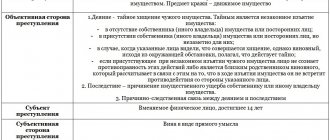Despite the fact that the standard of living is declining, the number of burglaries in Russia has recently decreased. However, one should not be consoled by this fact, because the number of episodes annually exceeds 100,000. Thieves identify apartments of wealthy people based on several criteria: the presence of air conditioning, satellite dishes, insulation of housing, expensive doors. In addition, attacks based on a tip are possible.
Single thefts are more common than acts committed by a group of people. Typically, criminals collectively act on a tip if there is actually a lot of property on the premises that is of interest to thieves. In addition, acts without prior agreement are possible.
These types of cases are complex and legal proceedings can take a long time. If you need the help of a qualified lawyer, our specialists are ready to help.
Criminal punishment for theft by a group of persons
The classification of acts and punishment for theft are provided for in Art. 158 of the Criminal Code of the Russian Federation, and for illegal actions committed by a group of persons - in Art. 35 of the Criminal Code of the Russian Federation. Crimes of this kind are determined by several criteria, the key ones being:
- number of participants;
- existence of a preliminary conspiracy;
- damage caused as a result of theft.
The peculiarity of the theft as such is its secret nature and the absence of bodily injury or other harm to the health of the victim. If such acts are accompanied by beatings, proceedings are initiated under Art. 161 for robbery. If a crime is committed with the use of a weapon, liability will arise under Art. 162 for robbery.
Theft without aggravating factors is qualified under Part 1 of Art. 158 of the Criminal Code of the Russian Federation. It provides for the following penalties:
- a fine in the amount of 200,000 rubles or the income of the attackers for 18 months;
- correctional labor for up to 2 years;
- imprisonment for up to 5 years.
However, the commission of theft by a group of persons by prior conspiracy is an aggravating factor. It is indicated in Part 2 of Art. 158 of the Criminal Code of the Russian Federation. In this case, the fine increases to 200 thousand rubles, and the prison term - up to five years.
If the act was committed by an organized group, then Part 4 of Art. 158 of the Criminal Code of the Russian Federation. The maximum penalty is 10 years in prison and a fine of up to one million rubles.
Note!
The amount of property lost as a result of theft also affects the punishment. If the damage is large—more than 250 thousand rubles—then the attacker faces a fine of up to 500 thousand rubles or up to 6 years. In case of particularly large damage - more than a million rubles - the fine increases to a million rubles, and the term - up to 10 years.
It is important to know that theft cannot always be classified as committed by a group of persons, even if there were two or more participants. The exceptions to the situation are as follows:
- if the group included a person under the age of 14 years. For example, if teenagers aged 15 and 13, as well as an adult, committed a crime, it will be considered single;
- if the theft was committed by one person, and the others acted as instigators.
Therefore, the investigation will still have to evaluate many circumstances in order to classify the theft as an act committed by a group of persons.
Theft. Qualifying features. Difference from robbery
Theft is the secret theft of someone else's property. The essence of theft is the unlawful, gratuitous seizure of someone else's property, its conversion in favor of the perpetrator, as well as other persons. These actions are committed only for mercenary purposes and are liable to cause material damage to the owner or possessor of the property.
The object of theft is legal relations belonging to the category of “property”. The objective side of theft as a form of theft is the secret illegal seizure of property in the absence of its owner or owner, as well as strangers, if such seizure was committed in their presence, but unnoticed by them. If outsiders saw that a theft was being committed, but the culprit, based on an analysis of the surrounding situation, believed that he was acting secretly, the act was also a secret theft of someone else’s property.
As a general rule , the theft is considered completed if the property is confiscated and the perpetrator has a real opportunity to use it, dispose of it at his own discretion, for example, turn the stolen property to his own benefit or to the benefit of other persons, or otherwise dispose of it for personal gain.
The subject of the theft can be any sane individual who has reached the age of 14. The subjective side of theft is characterized by the presence of direct, usually specific, intent and selfish purpose.
Theft of someone else's property through theft, fraud, misappropriation or embezzlement is considered petty if the value of the stolen property does not exceed 1000 rubles. (note to Article 7.27 of the Administrative Code). Theft of someone else's property in the amount of less than 1000 rubles. if there are signs of crimes provided for in Parts 2 - 4 of Article 158, Parts 2 and 3 of Art. 159, part 2 and 3 art. 160 of the Criminal Code, entails not administrative, but criminal liability (Article 7.27 of the Administrative Code).
Qualified types of theft are regulated by Part 2 - 4 158 Articles.
According to Part 2, these are theft committed by a group of persons by prior conspiracy; with illegal entry into the premises or other storage; causing significant damage to a citizen; from clothes, bags or other carry-on luggage.
Theft committed by a group of persons by prior conspiracy is an act committed by two or more persons who have agreed in advance to jointly commit a crime. When qualifying the actions of the perpetrators as secret theft of someone else's property by a group of persons by prior conspiracy, it is necessary to find out whether such a conspiracy of accomplices took place even before the start of actions directly aimed at stealing someone else's property.
It is also necessary to check: whether there was an agreement on the distribution of roles in order to carry out the criminal intent, what specific actions were committed by each perpetrator and other accomplices of the crime. Responsibility for theft committed by a group of persons by prior conspiracy also occurs in cases where, according to a preliminary agreement between the accomplices, the direct seizure of property is carried out by one of them, if the other participants, in accordance with the distribution of roles, performed concerted actions in the form of direct assistance to the perpetrator.
Theft with illegal entry into a premises or other storage facility. Unlawful entry into a premises or other storage facility means unlawful secret or open entry committed for the purpose of committing theft. Penetration into buildings or structures is also carried out when the perpetrator removes stolen objects without entering the corresponding premises.
Premises - buildings and structures intended for the temporary residence of people and the placement of material assets (warehouses, workshops, farms).
Storage facilities are various structures (tanks, barrels, containers), as well as specially designated areas of the territory intended for storing material assets. The fact of illegal entry into a home, premises or storage facility is evidenced by the moment the intent to seize someone else’s property arises. If a person entered legally and the intent to steal arose after the entry, then there is no sign of theft by penetration in his actions.
Theft causing significant damage to a citizen . The significance of the damage caused by theft to a citizen is evidenced by the importance and significance of the consequences of the crime both for the victim himself and for his family. To justify the presence of this qualifying feature (clause “c” of Part 2 158 of the article), it is necessary to analyze the property status of the victim, the real value of the stolen property, its significance for the victim, the size and frequency of his income (wages, pensions), whether he has dependents, the total income of family members with whom he runs a joint household, etc.
the victim must have suffered material damage, which cannot be less than 2,500 rubles. If the damage caused as a result of the theft does not exceed the specified amount or the damage did not occur due to circumstances beyond the control of the perpetrator, the act may be classified as attempted theft causing significant damage to a citizen, provided that the intent of the perpetrator was aimed at stealing property in a significant amount .
Theft from clothes, bags and other carry-on luggage that were with the victim . In this case we are talking exclusively about “pickpocketing”, i.e. about thefts from pockets, bags, briefcases, suitcases, as well as these bags, briefcases, suitcases themselves. The secret theft of luggage handed over to a transport organization, as well as individual items from the luggage, should be classified as theft from storage.
Particularly qualified types of theft (Part 3,158 of the article) are secret theft: with illegal entry into a home; from an oil pipeline, oil product pipeline, gas pipeline; on a large scale.
Home burglary . Unlawful entry into a home is defined as an unlawful secret or open entry committed for the purpose of committing theft. Penetration into a dwelling is also carried out when the culprit removes stolen items without entering the interior of the dwelling.
Dwelling - an individual residential building, with residential and non-residential premises included in it, any other residential premises included in the housing stock and suitable for permanent or temporary residence (individual apartments, rooms in communal apartments and dormitories, rooms in hotels and campsites), and or any other room or structure intended for temporary residence (caravans, tents, huts, dugouts). The fact of illegal entry into a home is evidenced by the moment the intent to seize someone else’s property arises.
Theft from an oil pipeline, oil product pipeline, or gas pipeline is a particularly qualified type of theft from a storage facility.
The objective side of this crime is the unauthorized withdrawal of oil, petroleum products and gas from pipelines.
Grand theft . According to paragraph 4 of the note. Article 158 recognizes the secret theft of someone else's property in an amount exceeding 250 thousand rubles. Theft on a large scale is qualified as multiple thefts of someone else's property, the total value of which exceeds 250 thousand rubles, if these thefts were committed in one way and under circumstances indicating an intent to commit theft on a large or especially large scale.
Theft by an organized group . The crime is qualified under paragraph “a” of Part 4 of Article 158 only if the theft is committed by a stable group of persons who have united in advance to commit one or more crimes (Part 3 of Article 35 of the Criminal Code). Such a group is characterized by stability, the presence in its composition of an organizer (leader) and a pre-developed plan for joint criminal activity, the distribution of functions between group members in preparation for committing a crime and the implementation of criminal intent.
Grand theft . According to paragraph 4 of the note. Article 158 recognizes the secret theft of someone else's property in an amount exceeding 1 million rubles. The theft of someone else's property, the total value of which exceeds 1 million rubles, is qualified as theft on an especially large scale, if these thefts were committed in one way and under circumstances indicating an intent to commit theft on a large or especially large scale.
If, in the course of committing theft, the actions of the culprit are discovered by the owner, another owner of the property or other persons, but the culprit, realizing this, continues to commit illegal seizure of property or retains it, the act is qualified as robbery, and in the case of the use of violence dangerous to life or health, or threats of such violence are like robbery.
The actions of the culprit do not develop into robbery if, while hiding, he is, for objective reasons, unable to get rid of the stolen property. For example, a person secretly stole clothes by wearing stolen items. At this point, the culprit is discovered by the owner. Hiding from the latter, the kidnapper, abandoning part of the stolen property as he walked, ran away, taking with him those items of clothing that he could not quickly take off.
The difference between theft and robbery: theft is the secret theft, and robbery is the open theft of someone else's property. Open theft of someone else's property is the theft that is committed in the presence of the owner or other owner of the property or in full view of strangers, when the person committing this crime is aware that those present understand the illegal nature of his actions, regardless of whether they took measures to suppress these actions or not.
Theft committed by a group of persons by prior conspiracy
If the theft was committed by a group of persons by prior conspiracy, Part 2 of Art. 35 of the Criminal Code of the Russian Federation. This legal act defines conspiracy as a preliminary agreement between all attackers.
The investigation will have to prove the fact of collusion. This can be done if there are witnesses or a confession from one of the group members. Also, the investigation may reveal facts indicating the fact of preparation of the act, for example, advance purchase of camouflage means, drawing up an action plan, etc. It may be accepted by the court as an aggravating circumstance.
What to do?
From all of the above, it should be concluded that a person may find himself on one side or another of the law. If you have been robbed, immediately write a statement to the nearest police station and do not be afraid of anything. The criminal who committed a crime against your property must be punished. Yes, and you can only return your property, which is obtained not without difficulty, in this way.
The application should be submitted to the head of the police department, in which the victim provides a detailed list of the stolen property, indicates its value, the circumstances under which the theft occurred, the date and time. Documents for ownership of property must be provided. If there were witnesses to the offense, then they must be included as well. Often, a decision in someone’s favor at a trial depends on the testimony of witnesses.
If you have been accused of theft, you should consult with a criminal lawyer who can prove your innocence or help you get a reduced sentence. To mitigate the sentence, you can also refer to mitigating circumstances, the list of which is contained in Article 61 of the Criminal Code of the Russian Federation.
Without prior agreement
Since theft committed by a group of persons by prior conspiracy is an aggravating circumstance, lawyers often insist that there was no conspiracy. A typical example of such a situation is when two people, without planning their actions, snatch a wallet or cut off a cable they just noticed.
Note!
The absence of prior agreement will allow the perpetrators to avoid the maximum punishment for the act. Most likely, the case will be limited to correctional labor, a suspended sentence or a minimum sentence.
Burglary
The most popular type of theft is residential theft. It is housing that most often becomes the object of close attention of intruders. Large amounts of property stored in residential premises often attract criminal groups. Responsibility for burglary, like any other, comes under Art. 158 of the Criminal Code of the Russian Federation. However, cases of this kind have their own characteristics.
- Regardless of the composition of the participants and how long they have known each other, burglary is always classified as an act committed by prior conspiracy.
- the aggravating factor in such cases is penetration into the victim’s home, which leads to the imposition of a more serious punishment;
- It is impossible to resolve the issue with the owners on the spot; the police are obliged to arrest persons, initiate a criminal case and go to court to choose a preventive measure.
Burglary is one of the most serious crimes, so you won’t be able to get by with “mild” penalties. The offender will be given a sanction based on the amount of damage he caused.
Theft as a type of crime
The criminalization of theft extends to the taking of any type of property that does not belong to the thief. The fundamental sign of theft is that the theft must necessarily be hidden, that is, its commission is unknown either to the owner of the property or to strangers. This also includes the seizure of valuables unknown to the owner, for example, due to the presence of excess goods that have not yet been identified by re-discounting. Theft is defined as a type of criminal activity by Article 158 of the Criminal Code of the Russian Federation. The article identifies various variations of theft and identifies distinctive features. Article 158 of the Criminal Code of the Russian Federation also indicates what types of responsibility await citizens for an offense committed.
Theft differs from petty theft by the total amount of material value of the stolen property. Theft is recognized as theft in cases where the amount of financial losses is at least five thousand rubles. Only if this condition is met does theft fall under Article 158 of the Criminal Code of the Russian Federation. Otherwise, the offense is considered a minor administrative offense.
The theft language has several distinctive features. It must be “free” (that is, at the end of the event the victim does not have any compensation left) and is committed for the purpose of personal profit or harm to the victim. Article 158 of the Criminal Code of the Russian Federation specifies several types of this crime. We will analyze group thefts in more detail. Gang theft is an illegal act in which two or more participants are involved. It would seem that everything is simple. But there are a number of features.
A person will be recognized as an accomplice if his legal capacity is confirmed, and at the time of the commission of the crime he has reached the age of criminal responsibility.
An example would be a case where a crime was committed by a twenty-seven-year-old woman and a twelve-year-old child; in this case, there would be no fact of a group offense. One of the perpetrators has not reached the age when he can be called to account.
Consequently, responsibility for the crime committed and for involving a minor in criminal activity lies with the adult participant. Theft cannot be considered a group theft either in those circumstances when it was committed by one person, and the other participants only incited the crime or assisted the criminal. It should be noted that separate regulations apply when it comes to theft committed by an organized criminal group with a constant number of perpetrators.
That is, group theft is such when there are several capable adult performers as suspects (accused). It is necessary to point out that the very formulation of group theft creates difficulties in definition, and similar problems arise with their classification.
Shoplifting by a group of people
Shoplifting is a special category of crime. The main reason is the lack of possibility of criminal prosecution. In the vast majority of cases, criminals steal a small amount of property. Its amount, as a rule, does not exceed the limit values established for initiating a criminal case, therefore administrative liability often arises.
If the damage does not exceed 1,000 rubles, the attacker faces a fine of up to five times the value of the stolen property, but not less than 1,000 rubles, arrest for up to 15 days, or compulsory labor for up to 50 hours.
If the damage ranged from 1,000 to 2,500 rubles, one of the following penalties will be imposed: a fine of up to five times the value of the stolen property, but not less than 3,000 rubles, arrest from 10 to 15 days, or compulsory labor for up to 120 hours.
However, if a group of persons participated in the case, the act will in any case be qualified under Art. 158 of the Criminal Code of the Russian Federation, since there is an aggravating factor.
Note!
Not always shoplifting can be classified as a breaking and entering crime. Unlike an apartment, a store is a public place, which means that during its operation there is no talk of intrusion. It’s another matter if the attackers visited the outlet after it was closed.
Burglary in a group
This is a common way to illegally obtain someone else's property. But Art. 158 of the Criminal Code of the Russian Federation does not provide for such a thing as hacking. In accordance with the law, this is unauthorized entry of third parties into private or government property. At the same time, the methods used by the attackers have virtually no effect on the severity of the punishment.
For a theft to be classified as a burglary, individuals do not even need to enter the premises. For example, if property was stolen using improvised means (magnet, rope, other devices), it will still be considered burglary with all the ensuing consequences. However, a break-in will not take place if the attackers entered the premises legally (for example, they had keys to the warehouse).









